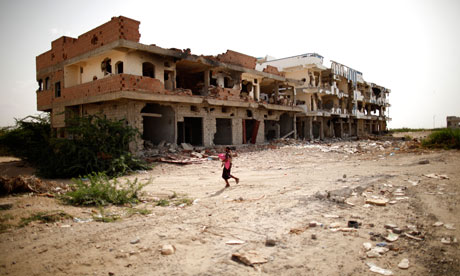July 28, 2012 by desertrose
Published on Jul 27, 2012 by linktv
Thousands of Yemeni protesters marched to the residence of President
Abd Rabbu Mansur Hadi after Friday prayers to demand the dismissal of
relatives of former president Ali Abdullah Saleh. Hadi, who had been
Saleh’s vice-president, was elected president unopposed in February
under a US-backed power transition plan brokered by Yemen’s Gulf
neighbours to end the political upheaval. The new president has vowed to
unify the army, which is divided between pro-Saleh units and those
loyal to a general who mutinied against the former president last year.
Hadi has removed about 20 top commanders, including some of Saleh’s
relatives. But the new president’s drive to remove Saleh’s relatives and
allies from power has faced stiff resistance. Hadi has promised to work
to bring home the thousands of internal refugees created by fighting
between government troops, southern separatists, mutinous military
units, and other factions. Footage and photograph courtesy of Reuters.Why is Yemen’s food crisis off the world’s humanitarian radar?
Media coverage associates Yemen with al-Qaida and insecurity. Is this, combined with donor fatigue, why we’re not sending aid?

A man walks past buildings destroyed during fighting between the
army and al-Qaida-linked militants in the southern Yemeni city of
Zinjibar on 18 June. Photograph: Khaled Abdullah Ali Al Mahdi/Reuters
Instead, Yemen’s continued economic and political turmoil has been exacerbated by an escalating food crisis. According to the World Food Programme, hunger in Yemen has doubled over the past two years. In May, aid agencies warned that almost half the country’s population of 25 million do not have enough food to eat and a third of children in some areas are severely malnourished. Then, last week, Oxfam – which cautioned last September that Yemen was at breaking point – issued a joint appeal with Islamic Relief for $38m, claiming that 5 million people are in need of emergency aid. The UN – which estimates that 267,000 children face life-threatening levels of malnutrition – has increased the total sought for its humanitarian appeal from $447m to $586m.
However, funds have so far been difficult to raise. At the Friends of Yemen conference held in Riyadh, Saudi Arabia, in May, international donors pledged $4bn in aid. But if and when this money will arrive – and how it will be deployed if it does – remain unclear.
Oxfam has been forced to freeze a cash-for-food scheme in the north-west governorate of Hajjah, while the scope of another initiative, in al-Hodeidah on the west coast, has been dramatically reduced. Islamic Relief has failed to raise any of the $2m needed for its planned nutrition and early recovery programmes, and the UN appeal remains only 48% funded.
In a country where politics and poverty are inextricably entwined, these shortfalls are crippling. Yemen’s faltering transition to democracy hasn’t been underpinned by the money given to other Arab spring countries; and its broader humanitarian plight has also failed to garner support. The question is, why?
Joy Singhal, the manager of Oxfam’s humanitarian response in Yemen, believes a lack of media coverage may be a factor. “It is not emotionally appealing, to my mind, to give money to Yemen,” says Singhal. “It is not a crisis like the tsunami in Indonesia or the earthquake in Haiti. Yemen is one of two or three Arab states in the Middle East considered to be a middle-income area. The world at large – people who might donate £5 or £10 in the UK or Europe – does not see Yemen as a priority case, because it isn’t in the media.
“The only issue in Yemen that we see in the media is security, al-Qaida, or bullets flying around. But what we are seeing at ground level is different. Security has never been a stumbling block to the delivery of aid, but getting that message across to the international community has been a challenge.”
Read Full Article Here
Related articles
- Yemeni protesters call for Saleh loyalists in military to be sacked (stripes.com)
- Yemeni leader denies rumor of U.S. control (upi.com)
- Yemen War Working-Out Just the Way CIA Had It Planned (therearenosunglasses.wordpress.com)
- Political crisis over, Yemen now faces a lack of food – MiamiHerald.com (miamiherald.com)

No comments:
Post a Comment
Hello and thank you for visiting my blog. Please share your thoughts and leave a comment :)